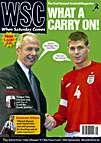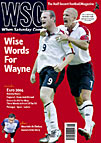 Dear WSC
Dear WSC
With League clubs’ financial departments having been brought back from Planet Zog – thanks to the generosity of ITV Digital – and the Conference’s introduction of a salary cap, one might have thought the days of mismanagement were over. Not in south Essex they’re not. How exactly have Hornchurch, who pull in 400 punters on a good day, been allowed to sign upwards of a dozen full-time pros? Latest rumours have them offering £100,000 for Chester’s Daryl Clare and a contract worth almost £3,000 per week. How do Weymouth feel now about their investment in Steve Claridge when the stakes have been raised to ridiculous levels in Conference Two? From Chelsea to Hornchurch, the practice of deliberately running clubs as loss-making concerns remains football’s biggest problem. Someone needs to sort it out, but I don’t suppose they will.
Alan Dawson, London W10
The Archive
Articles from When Saturday Comes. All 27 years of WSC are in the process of being added. This may take a while.
 Lincoln City boss Graham Taylor announced his arrival on the managerial scene as his side's outstanding home record gave them the Division Four title, Roger Titford recalls
Lincoln City boss Graham Taylor announced his arrival on the managerial scene as his side's outstanding home record gave them the Division Four title, Roger Titford recalls
The long-term significance
This was the season that launched Graham Taylor’s career. Look at those Lincoln City stats – 71 home goals (an average of more than three a game!), 111 in all and 74 points (equivalent to 106 with three points for a win). Among the stars of the side were John Ward and Percy Freeman up front; Ian Branfoot and Sam Ellis at the back. Two years later Taylor nearly repeated the feat with Fourth Division Watford. Sadly, international football was another matter.
 In WSC 208 we asked you all sorts of questions, such as who would win Euro 2004 and your feelings about a range of clubs. Roger Titford crunches the numbers
In WSC 208 we asked you all sorts of questions, such as who would win Euro 2004 and your feelings about a range of clubs. Roger Titford crunches the numbers
Results from the WSC 2004 survey show that readers totally disgraced themselves as prediction pundits. The top three picks to win the tournament – France 44 per cent, Italy 17 per cent and Spain 12 per cent – were all out before the semi-finals. Only three per cent had Greece even as quarter-finalists. In defence of our readership, it must be said that 50 per cent never bet on football and we can see why.
 Beginning our European Championship reports from writers in Portugal, Philip Cornwall offers an upbeat assessment of the England experience, where expectations were met on the pitch and exceeded off it – even if the portents for 2006 are shakier
Beginning our European Championship reports from writers in Portugal, Philip Cornwall offers an upbeat assessment of the England experience, where expectations were met on the pitch and exceeded off it – even if the portents for 2006 are shakier
C autious optimism, last month’s WSC editorial suggested, was in order on and off the pitch for England at Euro 2004. I should have paid attention. Ten minutes from time against Portugal I was edging nervously past caution and starting to dream. Then again, what happened next was a long, long way from the England nightmares of the past. The national team have won two European quarter-finals: in 1968 against Spain in a home-and-away tie, and against the same opponents in 1996 when, as hosts, they won on penalties after the opposition had had a goal disallowed controversially. Any sensible analysis of England’s exit has to have this context: it rarely gets any better than this and could so easily have done so.
 Tuesday 1 England scrape a 1-1 draw with Japan, who should have won after Shinji Ono equalised Michael Owen’s first-half goal. Sven’s not flustered: “The game today was not important. We were superb for 30 minutes but then we got tired.” Rafael Benítez resigns as Valencia coach and will shortly takeover at Liverpool. Inverness are turned down for promotion to the Scottish Premier League after failing to get the required two-thirds vote.
Tuesday 1 England scrape a 1-1 draw with Japan, who should have won after Shinji Ono equalised Michael Owen’s first-half goal. Sven’s not flustered: “The game today was not important. We were superb for 30 minutes but then we got tired.” Rafael Benítez resigns as Valencia coach and will shortly takeover at Liverpool. Inverness are turned down for promotion to the Scottish Premier League after failing to get the required two-thirds vote.